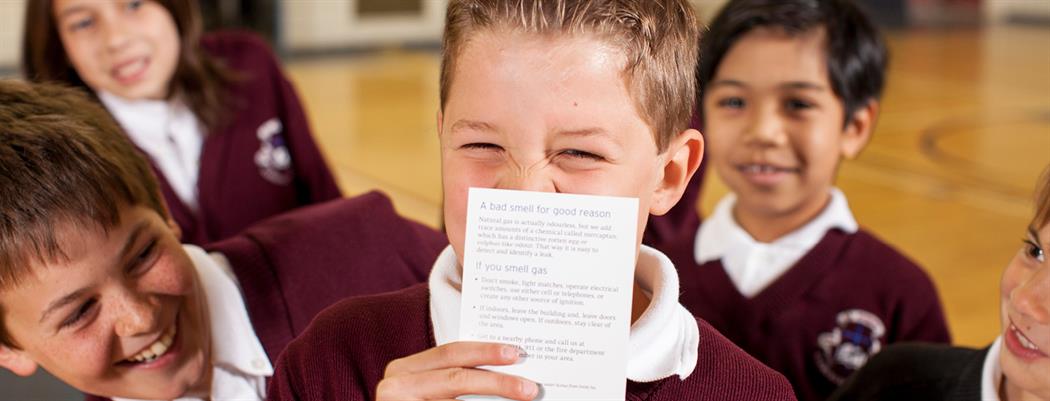Kids' safety corner

We have resources on energy safety for teachers and parents to share with kids and teens, including activities designed for students ages five to 12.
Safety tips for kids
We all use energy safely every day to heat our homes, cook our food and keep our computers running. But there are a few things you should be aware of to make sure you stay safe around natural gas and electricity.
General safety
- Ask for permission before using things that give off heat, like stoves and fireplaces.
- Always obey warning signs and stay out of fenced areas with warning signs – there may be equipment at work that could hurt you.
Natural gas
We make sure natural gas has a funny smell, like boiled or rotten eggs. That’s because we want you to be able to smell natural gas leaks. Smell boiled or rotten eggs? Tell an adult right away, then go outside together and call the FortisBC Emergency Line at 1-800-663-9911 (24 hours) or 911.
A few more tips to keep you safe around natural gas:
- Never climb on or play near gas meters.
- Don’t attach anything to a gas meter. This includes locking up your bike or tying your dog’s leash to the meter.
- Click or call before you dig. Gas lines are buried under the soil and if you dig and hit one, it could cause problems for the whole neighbourhood.
Electricity
- Never mix water and electricity.
- Never touch or play with exposed wires or electric outlets.
- Stay at least 10 metres away from power lines – about the length of a school bus.
- Tell an adult or call 911 if you see a fallen power line, and stay away from it.
- Never try to get a balloon or kite that is tangled in a power line. Ask an adult to call your electricity utility.
Make a personal emergency kit for children
If your child is at school when an accident or emergency occurs, a personal emergency kit they can leave at school can provide comfort and necessary items.
Include your family emergency plan
You can buy ready-made kits online or assemble one yourself to be stored in their locker, cubby hole or other convenient location at school. Include a copy of your family’s emergency plan with:
- where you will meet in an emergency
- names and contact information for each family member
- the name of the person authorized to pick up your kids if you can’t get there
- the name and number of an out-of-town emergency contact
What to pack
If possible, pack enough food and water for three days. Here are some ideas to get you started:
- granola bars or other quick-energy, child-friendly foods that don’t require heating
- bottled water
- whistle
- emergency blanket
- flashlight and batteries and/or lightstick
- basic first aid kit, such as adhesive bandages
- hygiene supplies, such as small pack of tissues, sanitary wipes or antibacterial lotion, comb and toothbrush and toothpaste
- comfort items, such as a book or game to pass the time, a toy or stuffed animal and/or a compact album with family photos
Customize the kit according to your child’s preferences, the climate where you live (for example, you may wish to add extra clothing or socks and gloves) and your school’s policies (such as nuts or allergens).
In collaboration with the BC Lions and Live It Earth, we support educational materials for teachers and students around energy efficiency, conservation and how to be positive environmental stewards